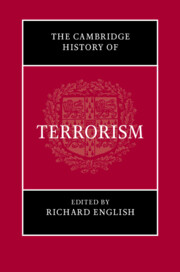Book contents
- The Cambridge History of Terrorism
- The Cambridge History of Terrorism
- Copyright page
- Contents
- Figures
- Tables
- Acknowledgements
- Contributors
- Part I Introduction
- Part II Frameworks and Definitions
- Part III Historical Case Studies in Terrorism
- 7 Terrorism in Israel/Palestine
- 8 Terrorism in the Basque Country
- 9 Terrorism in African History
- 10 The History of Terrorism in Pakistan
- 11 Political Violence in Ireland
- 12 Terrorism in the Russian Empire
- 13 Terrorism in Post-Soviet Russia
- 14 Terrorism in the Netherlands
- 15 Terrorism: An American Story
- 16 Political Violence and Terrorism in Colombia
- 17 The Paths of Terrorism in Peru
- 18 Aiqtihams (Whirlwind Attacks)
- 19 Transnational Connections
- Part IV Thematic Essays
- Part V Conclusion
- Index
- References
12 - Terrorism in the Russian Empire
The Late Nineteenth and Early Twentieth Centuries
from Part III - Historical Case Studies in Terrorism
Published online by Cambridge University Press: 07 May 2021
- The Cambridge History of Terrorism
- The Cambridge History of Terrorism
- Copyright page
- Contents
- Figures
- Tables
- Acknowledgements
- Contributors
- Part I Introduction
- Part II Frameworks and Definitions
- Part III Historical Case Studies in Terrorism
- 7 Terrorism in Israel/Palestine
- 8 Terrorism in the Basque Country
- 9 Terrorism in African History
- 10 The History of Terrorism in Pakistan
- 11 Political Violence in Ireland
- 12 Terrorism in the Russian Empire
- 13 Terrorism in Post-Soviet Russia
- 14 Terrorism in the Netherlands
- 15 Terrorism: An American Story
- 16 Political Violence and Terrorism in Colombia
- 17 The Paths of Terrorism in Peru
- 18 Aiqtihams (Whirlwind Attacks)
- 19 Transnational Connections
- Part IV Thematic Essays
- Part V Conclusion
- Index
- References
Summary
Russia was an integral part of the modern world’s first historical wave of terrorism, which lasted from the final third of the nineteenth century to the first decades of the twentieth century. Some historians and terrorism experts even consider the Russian Empire to be the ‘birthplace’ of terrorism. Indeed, in Russia, terrorism as a systematic tactic of revolutionary strategy, with its own ideological justification and organisational framework, took shape in 1869–81, is usually dated back to Sergei Nechayev’s ‘Catechism of a Revolutionary’ and was developed and applied in practice by the Narodnaya Volya (‘People’s Will’) organisation. By the start of the twentieth century, terrorist bombings in British India, the Balkans and elsewhere were often referred to as ‘the Russian way’, or ‘the Russian method’. Along with anarchist terrorism in Europe, which started to spread roughly at the same time, and the early resort to terrorist means by some national liberation and anti-colonial movements, Russian revolutionary terrorism of the late nineteenth century was certainly one of the first identifiable forms and clear manifestations of modern terrorism. Placing the Russian case in a global historical context allows us to assess the extent to which its national experience forms, conforms to or deviates from global trends in terrorism.
- Type
- Chapter
- Information
- The Cambridge History of Terrorism , pp. 284 - 312Publisher: Cambridge University PressPrint publication year: 2021
References
Further Reading
- 1
- Cited by

